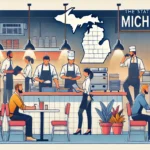Several types of liquor licenses are available to businesses in the State of Michigan. You will first need to determine which type of license will be needed for your operation. There are three tiers: Supplier (Manufacturer included in Supplier Tier), Wholesaler, and Retailer. Each tier has multiple licenses and/or special licenses, permits, permissions, and approvals.
There are many components to obtaining a liquor license that each have requirements and processes from gathering the necessary documents and submitting the application, to getting successfully approved for a liquor license. An experienced attorney familiar with the processes and challenges involved when obtaining a liquor license is key.
Determining Liquor License Allotment
In Michigan, only one (1) Specially Designated Distributor (SDD) license shall be issued by the Commission for every 3,000 of population, or a fraction thereof for cities, incorporated villages, or townships. The quota requirement may be waived at the discretion of the Commission if there is no Specially Designated Distributor licensee within 2 miles of the applicant’s proposed location, measured along the nearest traffic route (MCL 436.1533).
Only one (1) Specially Designated Merchant (SDM) license shall be issued by the Commission for every 1,000 of the population in cities, incorporated villages, or townships. The quota requirement may be waived at the discretion of the Commission if there is no Specially Designated Merchant licensee within 2 miles of the applicant’s proposed location, measured along the nearest traffic route (MCL 436.1533).
And, only one (1) public on-premises license (A-Hotel, B-Hotel, Class C, or Tavern license) shall be issued by the Commission for every 1,500 of population, or a major fraction thereof for cities, incorporated villages, or townships (MCL 436.1531).
If you are looking to apply or purchase an existing liquor license, the Law Offices of Barton Morris can help you locate licenses and assist with the acquisition and application process. Because these licenses are limited, it can be challenging to find the right type of license in the location you want. Our attorneys have helped business owners and operators with proven success, locate and secure liquor licenses.
Retail Application Process
Because each application can vary from others based on the requests, the Commission cannot give a definitive length of time it will take to process the application. During each step of the process, requests are reviewed in the date order that they were received. Generally, the Commission will:
- Receive the documents requesting a new license or license transfer, inspection, along with submission of any fees pertaining to the license(s).
- Review documents for thoroughness and completeness and verify that the appropriate fees have been received. Licensing will contact the applicant should further documents, fees, or corrections need to be made. Once everything has been approved, Licensing will submit the request to the Enforcement Division for its investigation. If the applicant has applied for and successfully meet the requirements for a conditional license, the request will be considered by the Commission.
- Proceed with the process and the Enforcement Division will contact the applicant to schedule an interview with the applicant and current licensee (for transfers). An appointed investigator will review the financial, property, purchase agreement and other items with the applicant. Once complete, the investigator will create a report for the Commission about the investigation and submit the request back to Licensing for the next steps of processing.
- Prepare for licensing consideration once the request is placed on a docket for an upcoming licensing meeting after Licensing has reviewed the report from Enforcement along with any other documents received during the interview/investigation process.
- Consider the request along with other determining factors such as: liquor license operating history of the applicant (if current or prior), the arrest and conviction record of the applicant, whether license requirement were met, the applicant’s financial information, and the opinions of the local legislative body or police department, if received. Approval or denial of the request are based on these things. On occasion, the Commission will request additional information from the applicant before making a final decision.
- Make a decision regarding the request which then will go back to Licensing for final processing.
Approval Process
Once approved, the Commission order is returned to Licensing for the closing process. The order will undergo a final review along with verification that all required fees and documents have been received. A cover letter, the Commission order, and request for any further needed documents will be sent to the applicant. This is considered the “closing package.” If everything has been received and acceptable, the file will be processed by the Renewal Unit for the physical license to be issued.
If your request is denied, the formal Commission order is sent to the unit in the Licensing Division that processes the closing documents. A copy of the denial order and a letter explaining how to appeal within 20 days is sent to the applicant. If you wish to request an appeal, we will make the request and Licensing will forward the request to the Hearings and Appeals Unit to begin the appeal process.
Learn more about how the Law Office of Barton Morris can help your business with obtaining a liquor license by scheduling a consultation today.





